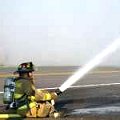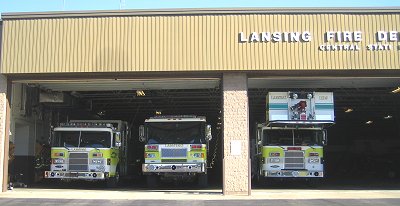- By Dan Veaner
- News
 Print
Print  The Lansing Fire Commissioners held a public budget hearing Tuesday, but the meeting room at Central Station was virtually empty. Not one member of the public showed up to offer advice or comment on the proposed 2009 budget.
The Lansing Fire Commissioners held a public budget hearing Tuesday, but the meeting room at Central Station was virtually empty. Not one member of the public showed up to offer advice or comment on the proposed 2009 budget.Nevertheless, the news on the $1,370,985 budget was good. "We have some revenues coming in and some unexpended balances," explained District Treasurer George Gesslein. "Property taxes will total $1,280,985. That's the levy, and the tax rate is 99 cents. That's about three cents below last year."
| Correction: In last week's Star we reported that the fuel budget for the Lansing Fire District had been doubled from $40,000 to $80,000 two years ago. This week we learned we were given numbers from the heating fuel, electric, and water budget line. The amount budgeted for medical oxygen, diesel and gas actually rose from $10,418 to $30,000 over the past two years. | ||
Gesslein says that he has budgeted conservatively to cover contingencies. But that often means that money that is budgeted is not spent. When that happens it goes into reserves. Currently there are about $2,000,000 in capital reserves. That will greatly reduce the amount the district will need to raise in bonds when two major building projects are realized. At the moment officials are working on a significant addition and upgrades to Central Station. A new fire station in the Village of Lansing is also planned.
As a volunteer fire department the overall budget is much smaller than a paid department's would be. Only a few positions receive salaries, including the district secretary, treasurer, and a number of district clerks who handle the necessary paperwork a fire department must process. Of those positions all are appointed except treasurer, which is an elected position. In 2009 all those salaries will only total $44,000. That is less than the district pays for workman's compensation insurance alone. The money the chief has available to fight fires is $55,000, the same as it was last year.
The amount budgeted for service awards has been raised by $3,000 from last year to $30,000. This is money awarded to active emergency responders who earn points for their amount of participation each year. The money is put into a retirement fund for qualifying volunteers as an incentive to attract people to volunteer. This year New York State raise the maximum that departments can contribute from $480 per year to $700, and Lansing Fire Commissioners chose to contribute the maximum allowed.
"We're getting some good participation in the service award program," Gesslein said. "The volunteers provide a tremendous service. That's a pretty small sum."

$9,000 is budgeted for hospital and medical costs for the volunteers, which is actually $5,500 less than last year. "All the volunteers that are active have to have a physical every year," says District Secretary Alvin Parker. "They have to have all the shots -- tetanus, hepatitis..."
Gesslein says the district's debt is minimal. "We don't have any building bond," he says. "They're all paid off. We're going to pay $70,000 on our outstanding truck bonds next year. We paid 85 this year. We're getting pretty close to getting them paid off."
Fire department spending caps are regulated by the state based on a formula that takes a district's population and wealth into account. Significant spending exclusions on items such as salaries, interest on bonds, insurance, liability, and service award payments, among others, raise the amount departments may spend. Lansing's budget is well below the cap. When you apply the exclusions the district has budgeted about a half million dollars less than allowed by state law.
With no public input fire commissioners will approve the 2009 budget at the next regular fire commissioners meeting on November 4th.
----
v4i41



